
David Hamilton Koch was an American businessman, political activist, philanthropist, and chemical engineer. In 1970, he joined the family business: Koch Industries, the second largest privately held company in the United States. He became president of the subsidiary Koch Engineering in 1979 and became a co-owner of Koch Industries in 1983. Koch served as an executive vice president of Koch Industries until he retired due to health issues in 2018.
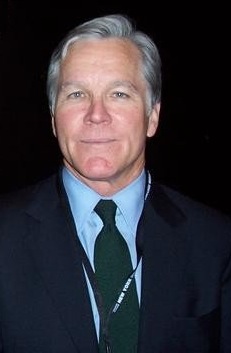
Bill Keller is an American journalist. He was the founding editor-in-chief of The Marshall Project, a nonprofit that reports on criminal justice in the United States. Previously, he was a columnist for The New York Times, and served as the paper's executive editor from July 2003 until September 2011. On June 2, 2011, he announced that he would step down from the position to become a full-time writer. Jill Abramson replaced him as executive editor.

Rikers Island is a 413-acre (167.14-hectare) island in the East River in the Bronx that contains New York City's largest jail.

Jane Meredith Mayer is an American investigative journalist who has been a staff writer for The New Yorker since 1995. She has written for the publication about money in politics; government prosecution of whistleblowers; the United States Predator drone program; Donald Trump's ghostwriter, Tony Schwartz; and Trump's financial backer, Robert Mercer. In 2016, Mayer's book Dark Money—in which she investigated the history of the conservative fundraising Koch brothers—was published to critical acclaim.
Leonard Anthony Leo is an American lawyer and conservative legal activist. He was the longtime vice president of the Federalist Society and is currently, along with Steven Calabresi, the co-chairman of the organization's board of directors. Leo has been instrumental in building a network of influential conservative legal groups funded mostly by anonymous donors, including The 85 Fund and Concord Fund, which serve as funding hubs for affiliated political nonprofits. He assisted Clarence Thomas in his Supreme Court confirmation hearings and led campaigns to support the nominations of John Roberts, Samuel Alito, Neil Gorsuch, Brett Kavanaugh, and Amy Coney Barrett.

Truthout is a progressive non-profit news organization which describes itself as "dedicated to providing independent reporting and commentary on a diverse range of social justice issues". Truthout's main areas of focus include mass incarceration, prison abolition, social justice, climate change, militarism, economy and labor, LGBTQ rights and reproductive justice.

Jeffrey Edward Epstein was an American sex offender and financier. Born and raised in New York City, Epstein began his professional life by teaching at the Dalton School despite lacking a college degree. After his dismissal from the school, he entered the banking and finance sector, working at Bear Stearns in various roles before starting his own firm. Epstein developed an elite social circle and procured many women and children whom he and his associates sexually abused.

The Vernon C. Bain Correctional Center is an 800-bed jail barge used to hold inmates for the New York City Department of Corrections. The barge is anchored off the Bronx's southern shore, across from Rikers Island, near Hunts Point. It was built for $161 million at Avondale Shipyard in Louisiana, along the Mississippi River near New Orleans, and brought to New York in 1992 to reduce overcrowding in the island's land-bound buildings for a lower price. Nicknamed "The Boat" by prison staff and inmates, it is designed to handle inmates from medium- to maximum-security in 16 dormitories and 100 cells.
GiveWell is an American non-profit charity assessment and effective altruism-focused organization. GiveWell focuses primarily on the cost-effectiveness of the organizations that it evaluates, rather than traditional metrics such as the percentage of the organization's budget that is spent on overhead.
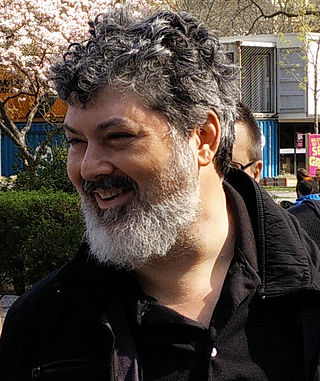
Carl Deal is an American documentary filmmaker and journalist. He is the producer and director of the films Trouble the Water and Citizen Koch, producer of Michael Moore's Where To Invade Next and Fahrenheit 11/9, and co-producer of Capitalism: A Love Story and Fahrenheit 9/11.
Charles G. and David H. Koch (1940–2019), sometimes referred to as the Koch brothers, have become famous for their financial and political influence in United States politics with a libertarian, more so, right-libertarian or American-style libertarian political stance. From around 2004 to 2019, with "foresight and perseverance", the brothers organized like-minded wealthy libertarian-oriented conservatives, spent hundreds of millions of dollars of their own money to build an "integrated" and "stealth" network of think tanks, foundations, "grassroots" movements, academic programs, advocacy and legal groups to "destroy the prevalent statist paradigm" and reshape public opinion to favor minimal government. As of mid 2018, the media has been encouraged to refer to the "Koch network" rather than the "Koch brothers".
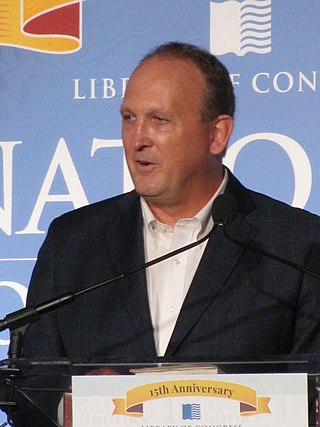
Kevin Sullivan is a Pulitzer Prize-winning American journalist, best-selling author and senior correspondent at The Washington Post.
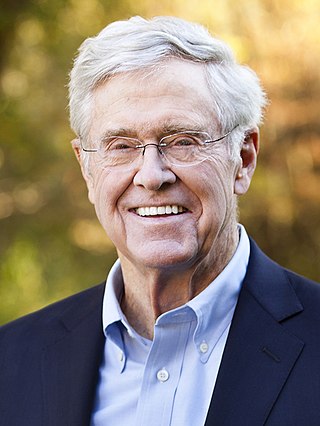
Charles de Ganahl Koch is an American billionaire businessman. As of November 2023, he was ranked as the 22nd richest man in the world on the Bloomberg Billionaires Index, with an estimated net worth of $60 billion. Koch has been co-owner, chairman, and chief executive officer of Koch Industries since 1967, while his late brother David Koch served as executive vice president. Charles and David each owned 42% of the conglomerate. The brothers inherited the business from their father, Fred C. Koch, then expanded the business. Koch Industries is the largest privately held company by revenue in the United States, according to Forbes.
The Marshall Project is a nonprofit news organization that seeks to create and sustain a sense of national urgency about inequities within the U.S. criminal justice system. The Marshall Project has been described as an advocacy group by some, and works to impact the system through journalism.
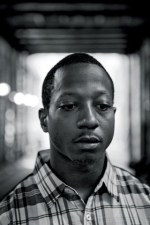
Kalief Browder was an African American youth from The Bronx, New York, who was held at the Rikers Island jail complex, without trial, between 2010 and 2013 for allegedly stealing a backpack containing valuables. During his imprisonment, Browder was in solitary confinement for 700 days.
Julia Preston is an American journalist and contributing writer for The Marshall Project, focusing on immigration. Preston was a foreign and national correspondent and an editor for The New York Times for 21 years, from 1995 through 2016. She was a member of the New York Times team, of four reporters and an editor, that won the Pulitzer Prize for International Reporting in 1998, "for its revealing series that profiled the corrosive effects of drug corruption in Mexico." She is the co-author, with Samuel Dillon, of Opening Mexico: The Making of a Democracy, "a sweeping account of a nation's struggle for democracy." It tells the story "of the citizens' movement that ended seven decades of harsh and kleptocratic one-party rule" in Mexico.

Public criminology is an approach to criminology that disseminates criminological research beyond academia to broader audiences, such as criminal justice practitioners and the general public. Public criminology is closely tied with “public sociology”, and draws on a long line of intellectuals engaging in public interventions related to crime and justice. Some forms of public criminology are conducted through methods such as classroom education, academic conferences, public lectures, “news-making criminology”, government hearings, newspapers, radio and television broadcasting and press releases. Advocates of public criminology argue that the energies of criminologists should be directed towards "conducting and disseminating research on crime, law, and deviance in dialogue with affected communities." Public criminologists focus on reshaping the image of the criminal and work with communities to find answers to pressing questions. Proponents of public criminology see it as potentially narrowing "the yawning gap between public perceptions and the best available scientific evidence on issues of public concern", a problem they see as especially pertinent to matters of crime and punishment.
"An Unbelievable Story of Rape" is a 2015 article about a series of rapes in the American states of Washington and Colorado that occurred between 2008 and 2011, and the subsequent police investigations. It was a collaboration between two American, non-profit news organizations, The Marshall Project and ProPublica. The article was written by Ken Armstrong and T. Christian Miller. It won the 2016 Pulitzer Prize for Explanatory Reporting and the 2015 George Polk Award for Justice Reporting.
Scott Hechinger is an American civil rights attorney, former public defender and the founder and executive director of Zealous, a nonprofit organization that trains public defenders and activists to use media, technology, the arts, and storytelling to shape criminal justice policy. Hechinger teaches at Columbia Law School as an adjunct professor.
Juan Manuel Merchan is an American judge and former prosecutor currently serving as an acting justice of the New York State Supreme Court in New York County (Manhattan).











